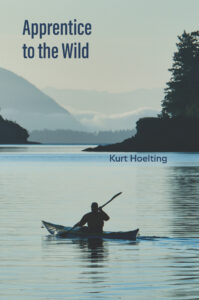
What follows is an excerpt from an interview with Kurt Hoelting, author of Apprentice to the Wild and featured speaker and Samaritan’s 2025 Spring Luncheon. A Seattle native, Kurt has led an active—and deeply reflective—life as a commercial fisherman and wilderness guide, based out of the Tongass region of Southeast Alaska.
Describing Kurt’s achievement in the book, Paul Wapner (Professor Emeritus, American University) writes, “With a poet’s elegance, a meditator’s sensitivity, and a philosopher’s insight, Hoelting helps us celebrate human experience in its fragile yet shining quality.” His responses that follow exhibit just those rare gifts.
From the opening passages of the book, I was struck by your relationship with risk-taking—not merely the acceptance of risk but, to some degree, your active pursuit of it. What would you say about that relationship and its importance?
Throughout my life, I have been fascinated by the relationship between risk and competence, risk and the scope of what we are capable of experiencing as human beings. While I took some foolish risks as an outdoorsman in my youth, as epitomized by the LeConte Bay story in my book, I do not see myself as having pursued gratuitous risks in my work as a fisherman and wilderness guide. I just loved living near the wild edge of nature, and I took pride in honing the skills required to navigate those edges well. It gave me a kind of membership in a much broader scope of human experience across time.
To subsist on this earth through the majority of human time was to live constantly with a level of risk that is difficult for us to imagine today. The risks I took were modest in comparison to what hunter/gatherer cultures took for granted, and in some ways we have placed ourselves at risk by losing touch with the kinds of skills and knowledge of place that we will need for survival as global supply chains break down.
On a more spiritual level, our capacity to embrace the truth of our human vulnerability and mortality requires us to accept risk as an intrinsic element in every human life. The transient nature of our lives entails risk: We cannot know in what moment, or by what means, our lives will end. To turn the other cheek is a risky choice. To offer love in the face of hate or intolerance is a risky choice. To stand up for justice when no one else is willing to do so is a hugely risky choice. Yet any life well lived requires just that.
Your personal evolution has led you into Christian ministry and then away from or beyond it. And yet your roles as writer, guide, and elder retain strong elements of ministry. How have you come to understand your vocation, the persistent aspects and the ones that have found new direction?
The Dalai Lama has famously said, “My religion is kindness.” I have gravitated in my spiritual orientation away from rigid dogmas and orthodoxies in any form, and toward a religion rooted in kindness, and the cultivation of kindness. All great religions have the practice of kindness at their core, so it is not a matter of one faith over against another, when kindness and compassion are the motivating factors. In that sense, I have never felt far from my calling as a minister.
I have worked a lot with Christian and Jewish faith practitioners, as well as Buddhist practitioners, and have been a teacher in the more secular mindfulness community as well. For me, the path toward the cultivation of compassion and kindness intrinsic to Buddhist meditation practices has been especially helpful in moving from abstract beliefs in the value of kindness, to the hard work of actually manifesting kindness. And yet I have no need to call myself a Buddhist, or renounce my affiliation with the Christian path. For me it is less a matter of “faith” than of “practice”.
Do you think the encounter with the wild, within and without, has particular relevance to the time we are living?
Absolutely. Especially now. From the standpoint of evolutionary biology, the human species emerged out of the same wild forces as every other species, and we are still learning how to manage and control the inner wildness of our nature. When things seem to be going crazy, and the level of chaos in our lives is high, as it certainly is right now, it is all the more important to stay rooted in present-moment awareness, and to cultivate kind attention in relation to the actual moment we are in.
For me, tending to the “wild within” is code language for skillfully inhabiting our direct experience of the moment at hand, and whatever difficulties and opportunities it presents. Often what that actually means, when the chips are down, is dealing with difficult or catastrophizing thoughts and emotions in real time, using the skills of our spiritual practice to self-regulate and re-engage the better angels of our nature—also in real time. That is easy to say but hard to do.
The negativity bias of our brains is a dominant part of what makes us wild creatures, because it ties us back to earlier, more primitive and reactive parts of our inherited “wild” nature. But it is also a part of our nature to have ready access to compassion and empathy, and to turn our negativity bias back toward connection and healing. I often think that this is the highest and best use of any authentic spiritual practice, or of any authentic practicing community.
